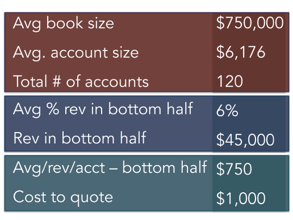Share article
There is an old saying that "revenue cures all problems." It's easy to appreciate the spirit of that adage, but the "wrong revenue" often makes the problems even worse. The toxic relationship the independent insurance agencies have with revenue/compensation is the biggest contributor.
Here’s a breakdown of what I mean

- Let’s assume an insurance producer has a $750,000 book of business.
- The average account generates a little under $6,200 of annual revenue.
- Therefore, it would be typical for the producer to have 120 accounts that make up that book.
- As we analyze books of business by listing accounts in descending size of revenue and look at the bottom half (the 50% of accounts that are the smallest in the book), we see that the bottom half of a book generates a little over 6% of the total revenue.
- In this scenario, 6% of $750,000 means the bottom half generates about $45,000 of revenue.
- Knowing there are 60 accounts in the bottom half, the average revenue-per-account in the bottom half is $750.
- We built a calculator and asked a couple dozen agencies to determine the cost to get quotes (fully insured medical, dental, life, disability, and voluntary) for prospects/clients. The average came back to around $1,000.
- So, in this typical scenario, the producer/agency is upside down by $250, on average, for half of the book of business. And this is just based on the cost to quote before any additional service work is performed or other services are given away.
Now, you would think, with that financial reality, the agency/producer would do everything they could to eliminate their unprofitable accounts, wouldn’t you?
But not only do they NOT get rid of them, they write more! Each unprofitable account causes the agency to bleed a little profit. Each “cut” may not be noticeable, but the collective effect is killing the growth and profitability of the agency.
Our ability to rationalize bad business decisions and make excuses is nothing short of remarkable.
Toxic relationships
And it all goes back to this toxic relationship with compensation. The collective “we” in this industry are so afraid to face that fear that we lie to ourselves and make excuses. Because we have no control over our revenue, we hold onto every $1 we have, even if it costs us $1.25 to hold on to it.
When I suggest to someone that they need to get rid of their unprofitable accounts, the excuses are predictable.
- “Some of those small groups might grow into big accounts.” The reality is that most of them NEVER will, and the cost to hold on to those who won’t grow FAR outweighs the upside of the one that does.
- “They can be referral sources.” What kind of strategy is that?! Do you want unprofitable groups to introduce you to more unprofitable groups? On top of that, some producers and agencies admit to NEVER going to existing clients to ask for referrals.
Be honest with yourself; not every account is a good one. You must become more disciplined in choosing which accounts you allow the privilege of having access to you, your team, and your resources. Allowing unprofitable accounts into your book of business is, at best, irresponsible.
But making these tough decisions isn’t simply about you. You must overcome this toxic relationship with your revenue/compensation for the benefit of everyone around you.
By avoiding difficult compensation issues...
- You hurt your vendor partners (the ones providing the “value-added services”) by devaluing their products. When you give it away and/or can't afford the effective implementation of those products/services, it reflects poorly on the quality of that product/service.
- You hurt your team members by saddling them with too many wrong accounts. With the smaller margins your book of business generates, as a result, they don't have growth opportunities; they don't get raises, and they don't get bonuses.
- You hurt your most profitable clients because they are subsidizing your most unprofitable. When half of your clients generate only 6% of revenue, they are subsidized by the other half, which produces 94%.
When you are willing to work for anyone, at any price, someone else must make up the difference. And those making up the difference are the people you need most. Don't continue forcing them to pay the price for your bad business decisions.
You’re better than that; you have to be. Learn how by downloading our Producer Annual Planning Guide.
Content provided by Q4intelligence
Photo by sqback

